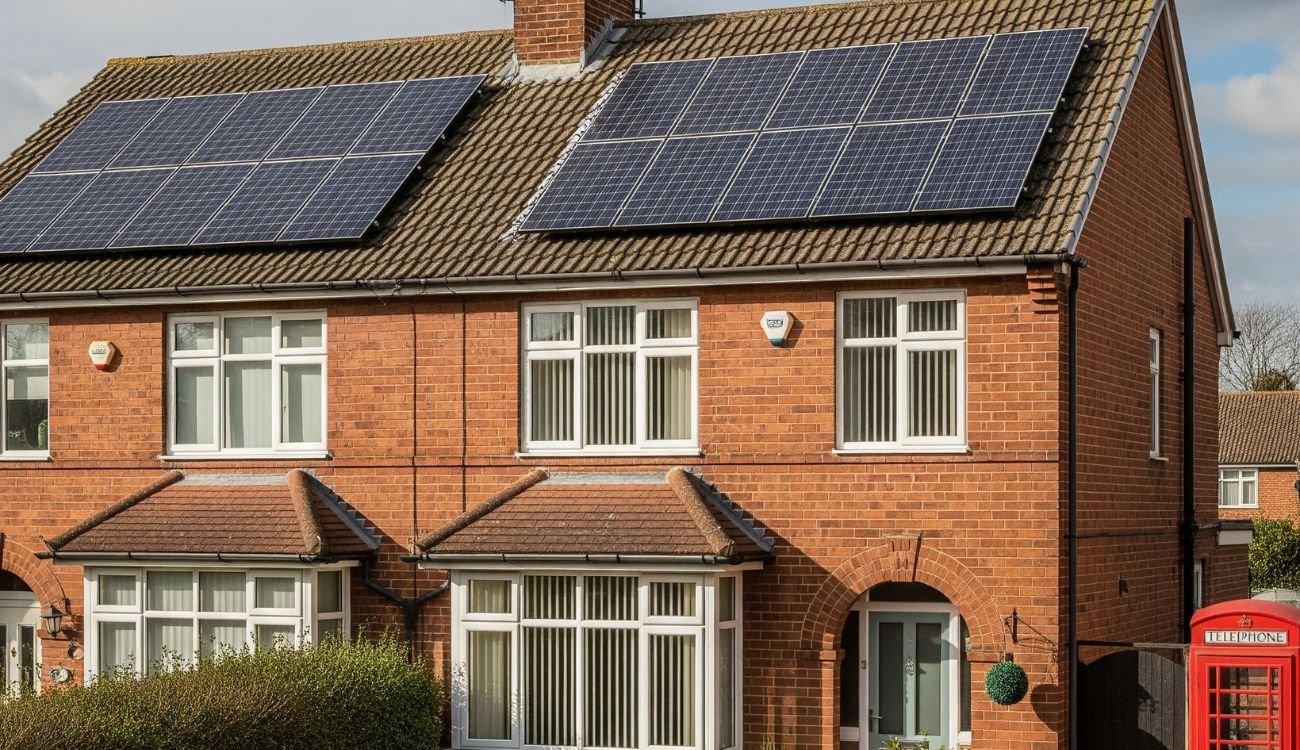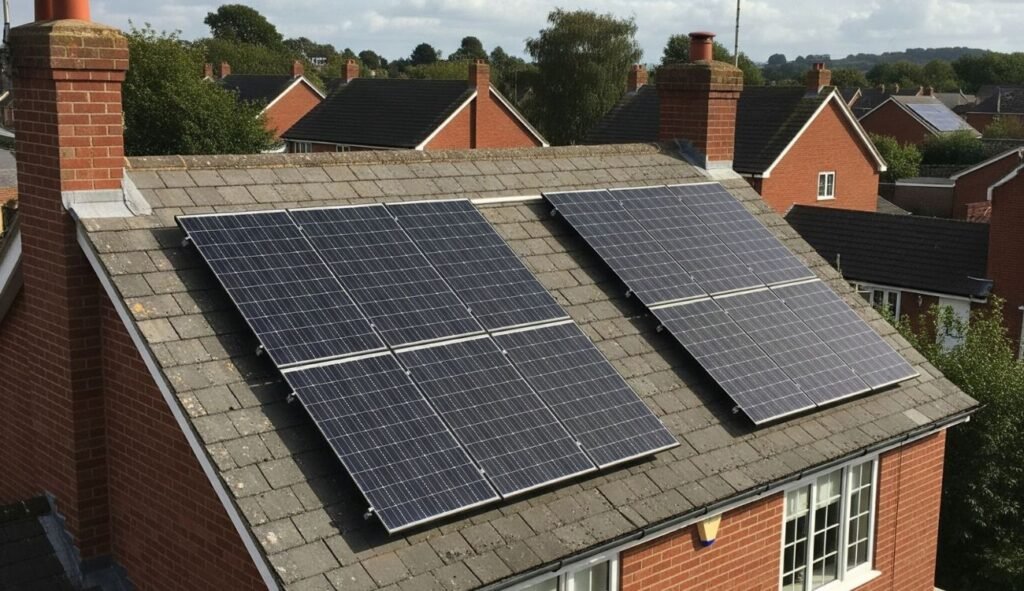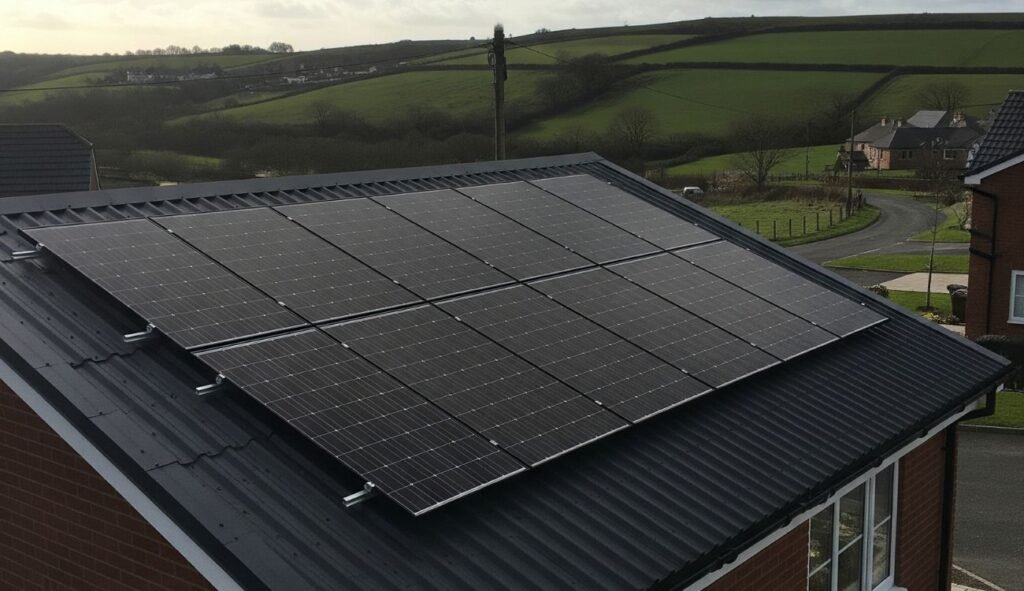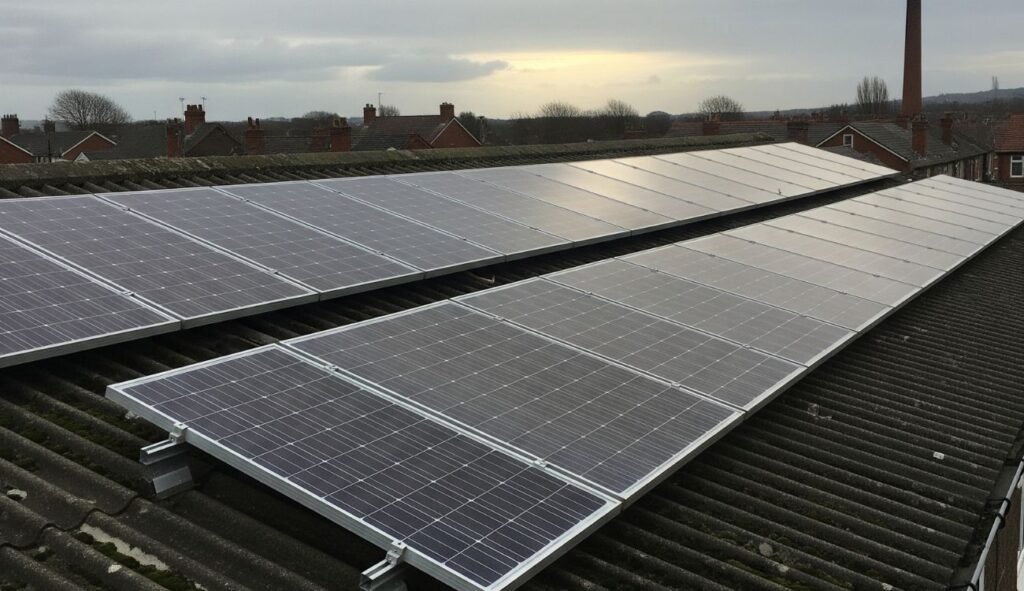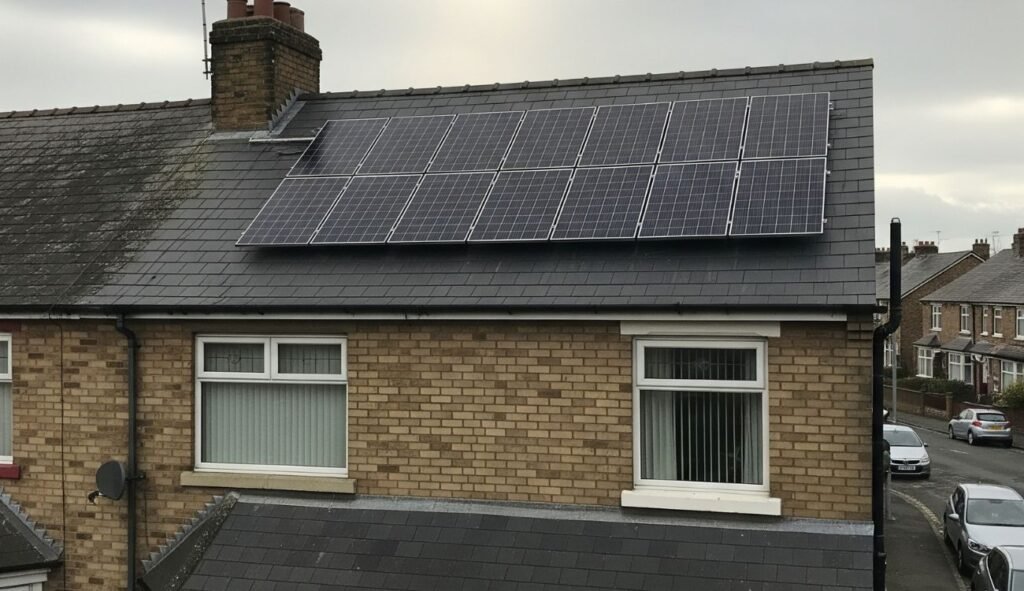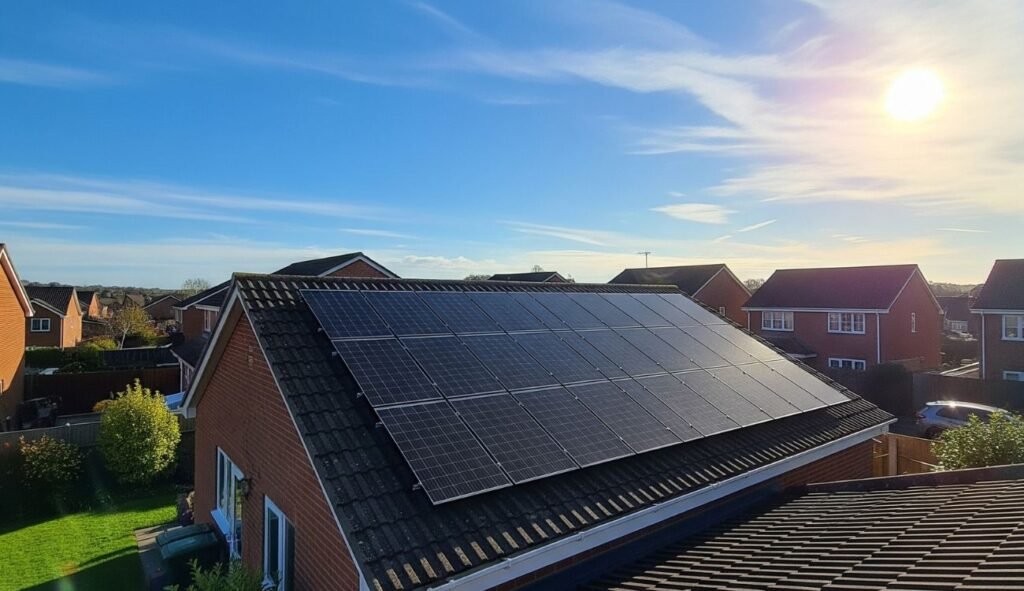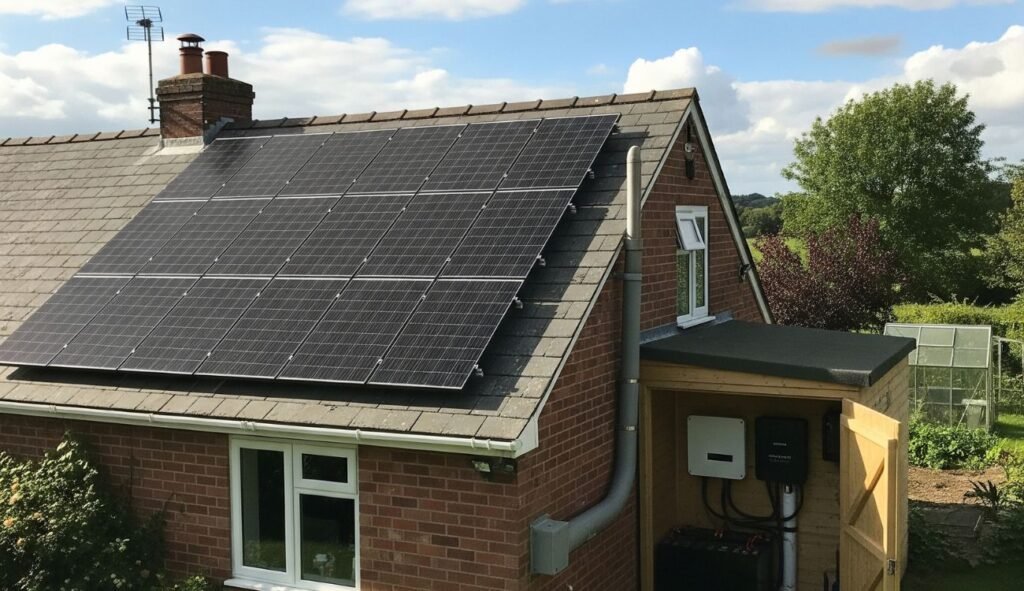Choosing solar panels for your property is an important investment, but are second-hand solar panels worth it? This question is especially relevant for UK homeowners and landlords looking to save on upfront costs without sacrificing quality or efficiency.
In this guide, we explore the pros and cons, cost implications, reliability, and key considerations to help you make an informed decision.
If you’re looking for expert solar panel installation in Tyne and Wear, Newcastle, or the wider North East, consider requesting a quote from Future Heat, a trusted local provider with a reputation for quality and service.
Are Second-Hand Solar Panels a Good Investment?
The short answer is: it depends. Choosing second-hand solar panels can be a tempting way to reduce the initial cost of switching to solar energy, but whether they represent good value for UK properties involves several important factors.
Cost vs. Performance Trade-Off
Second-hand solar panels typically come at a significantly lower price point, often 30 to 50% less than brand-new panels.
For homeowners or landlords on a tight budget, this can make solar energy more accessible and speed up the time it takes to recoup the initial investment. However, this upfront saving may come with compromises in terms of energy production, efficiency, and lifespan.
Solar panels degrade naturally over time, usually losing around 0.5% to 1% efficiency each year. This means a second-hand panel that’s 10 years old could be producing 10% or more less energy compared to a new panel.
Over the long term, this reduction in output can affect your energy savings and the overall return on investment.
Warranty and Reliability Considerations
New solar panels usually come with manufacturer warranties lasting 10 to 25 years, covering defects and power output.
These warranties provide reassurance that your panels will perform reliably for decades. Unfortunately, second-hand panels rarely come with transferable warranties, leaving buyers exposed to potential repair or replacement costs if problems arise.
Additionally, second-hand panels may have been exposed to environmental wear and tear, such as hail damage, micro-cracks, or corrosion that can reduce their lifespan and energy output.
Without a thorough inspection by a qualified installer, these hidden defects can go unnoticed until after purchase.
Incentives and Certification Impact
In the UK, government-backed incentives and tariff schemes like the Smart Export Guarantee (SEG) require solar panels to be certified under the Microgeneration Certification Scheme (MCS) to qualify.
Most second-hand panels do not meet these certification standards, which can disqualify your system from receiving payments for excess electricity exported to the grid.
This limitation reduces the financial benefits of second-hand panels compared to new certified systems and may lengthen the time it takes to recover your costs.
Environmental and Sustainability Angle
On the positive side, choosing second-hand solar panels aligns with sustainable principles by extending the life of existing materials and reducing manufacturing demand.
This reuse helps lower the carbon footprint associated with producing new panels, contributing to a circular economy.
Suitability for Different UK Property Types
Whether second-hand solar panels are a good investment can also depend on your property type and energy needs. For residential homeowners in urban areas with moderate energy consumption, the slightly reduced efficiency might still provide meaningful savings.
However, landlords managing rental properties or owners of commercial buildings, where reliable and predictable energy output is essential may prefer new panels to ensure maximum performance and compliance with regulations.
What Are the Pros and Cons of Second-Hand Solar Panels
| Pros |
|---|
| Lower upfront cost: Used panels typically cost 30-50% less than new ones. |
| Faster ROI: Reduced installation costs can lead to quicker returns on investment. |
| Eco-friendly choice: Reusing panels supports sustainability by reducing waste. |
| Cons |
|---|
| Reduced efficiency: Panels degrade around 0.5-1% per year, so older panels generate less energy. |
| Shorter lifespan: Used panels have fewer years of effective use remaining. |
| Warranty limitations: Most second-hand panels lack the manufacturer’s warranty. |
| Potential hidden damage: Panels may have micro-cracks or other unseen defects. |
According to the Energy Saving Trust, second-hand solar panels can be a cost-effective choice but buyers should carefully inspect panel condition and consider installation by a certified professional.
What Should Buyers Check Before Investing in Second-Hand Solar Panels?
Before investing in second-hand panels, it’s important to evaluate their condition, compatibility, and certification status. Here’s a checklist to help:
| Checkpoint | What to Look For |
|---|---|
| Panel age | Preferably less than 10 years old for reasonable efficiency. |
| Power output rating | Confirm current wattage to compare against original specifications. |
| Visual inspection | Check for cracks, discoloration, or corrosion. |
| Certification | Ensure compliance with UK standards (e.g., MCS certification). |
| Installation history | Request details on how and where the panels were previously installed. |
| Warranty availability | Confirm if any transferable warranty exists. |
The Microgeneration Certification Scheme (MCS) is the UK government-backed certification you should look for when buying panels, new or used. Panels without MCS certification may not be eligible for some financial incentives or meet safety standards.
New vs. Second-Hand Solar Panels
| Criteria | New Solar Panels | Second-Hand Solar Panels |
|---|---|---|
| Cost | Higher upfront cost | Lower upfront cost |
| Efficiency | Higher, near full rated output | Reduced, depending on age and condition |
| Lifespan | 25-30 years | 10-15 years |
| Warranty | Usually 10+ years manufacturer’s warranty | Usually no warranty |
| Eligibility for Incentives | Eligible (MCS certified) | Often ineligible |
| Installation Requirements | Professional installation recommended | Professional installation recommended |
| Environmental Impact | New manufacturing impact | Reuse reduces waste |
How Does the Cost of Second-Hand Solar Panels Compare to New Ones?
Cost is a primary factor for many buyers. Below is a comparison of average costs and expected savings in the UK market.
| Item | New Solar Panels (per kW) | Second-Hand Solar Panels (per kW) |
|---|---|---|
| Cost of panels | £700 – £1,000 | £400 – £600 |
| Installation cost | £1,000 – £1,500 | £800 – £1,200 |
| Total upfront cost | £1,700 – £2,500 | £1,200 – £1,800 |
| Typical lifespan | 25-30 years | 10-15 years |
| Efficiency loss/year | 0.5-1% | Potentially higher if panels are older |
According to Ofgem, solar panels that are part of the Renewable Heat Incentive or other government-backed schemes must meet strict standards, which second-hand panels often do not. This could affect eligibility for incentives.
Are Second-Hand Solar Panels Eligible for UK Incentives and Tariffs?
One key consideration is whether second-hand panels qualify for government schemes like the Smart Export Guarantee (SEG). The SEG pays households for excess electricity exported back to the grid.
- According to Ofgem, solar panels must meet MCS certification standards to be eligible for SEG payments.
- Most second-hand panels lack this certification, which may disqualify them from the SEG and other financial benefits.
- Homeowners using uncertified panels could miss out on valuable income streams and savings.
Therefore, while second-hand panels reduce upfront costs, they may limit financial incentives available in the UK market.
How Do I Know If Buying Second-Hand Solar Panels Is Right for Me?
Making the decision to invest in second-hand solar panels can be tricky. To help you decide, here’s a straightforward guide that explains who should consider this option, who might want to avoid it, and key reasons to choose second-hand panels.
Who It’s For
- Budget-conscious homeowners and landlords looking to enter solar energy with lower upfront costs.
- Eco-conscious buyers who want to reduce waste and extend the lifecycle of existing solar panels.
- Properties with smaller energy needs or secondary buildings where absolute peak performance isn’t critical.
- Those comfortable with accepting some risk around panel condition and warranty limitations.
- DIY enthusiasts or those working with trusted, professional installers who can thoroughly inspect and certify the panels before installation.
Who Is Not For
- Homeowners or landlords seeking long-term reliability and maximum energy output from their solar system.
- Properties that require MCS certification for government incentives or eligibility for the Smart Export Guarantee (SEG).
- Commercial or rental property owners who need guaranteed system performance and warranty protection to comply with regulations or lease agreements.
- Those unwilling or unable to invest in professional installation and thorough panel testing.
- Buyers who prefer the security of a full manufacturer warranty and longer panel lifespan.
Choose It If
- You want to reduce your initial investment cost but still benefit from solar-generated electricity.
- You understand and accept the trade-offs in efficiency, lifespan, and financial incentives.
- You have access to a trusted solar professional who can assess panel condition and safely install your system.
- You are motivated by environmental sustainability and reducing electronic waste by reusing existing panels.
- You have a property or application where modest power generation is sufficient, such as smaller homes, outbuildings, or secondary properties.
Frequently Asked Questions (FAQs)
Yes, but it requires careful system design to ensure compatibility and efficiency. Differences in panel efficiency and age can affect overall system performance.
Request performance data, visual inspection reports, and, if possible, testing with professional equipment before purchase.
When installed by certified professionals following UK electrical safety standards, second-hand panels can be safe, but ensure thorough checks are done.
Some insurers may have specific requirements or may consider second-hand panels differently. Check with your provider before installation.
Due to lower costs but reduced efficiency, payback periods typically range from 5 to 10 years, depending on system size, location, and electricity prices.
Our Verdict
Are second-hand solar panels worth it? The answer depends on your budget, energy goals, and willingness to accept trade-offs in efficiency, lifespan, and eligibility for government incentives.
For many UK homeowners and landlords, second-hand panels offer an attractive lower-cost entry into solar energy, but come with risks such as reduced performance and lack of warranty.
If you want peace of mind, eligibility for financial incentives, and reliable performance over decades, investing in new, certified solar panels is usually the safer choice. Whatever your decision, working with a trusted, professional installer like Future Heat in Tyne and Wear and the North East ensures your solar investment is safe, efficient, and tailored to your needs.
Myles Robinson is a seasoned expert in the boiler and home improvement industry, with over a decade of experience. He is deeply committed to environmental sustainability, actively promoting energy-efficient heating solutions to help households reduce their carbon footprint. By combining industry expertise with a dedication to environmental responsibility, Myles continues to lead efforts in transforming home heating practices towards a more sustainable future.

